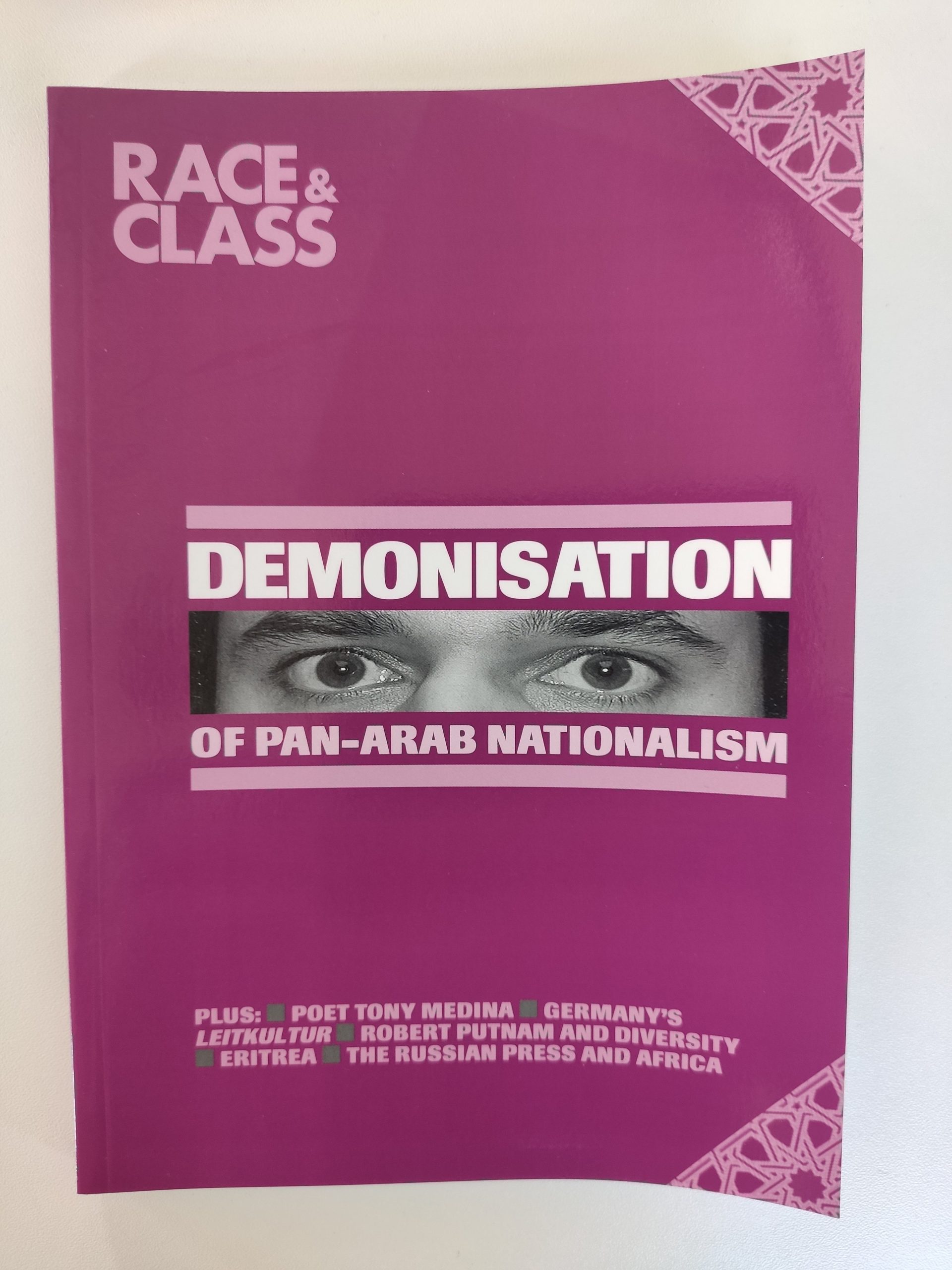Description
The April 2005 edition of the IRR journal Race & Class features articles on the demonisation of pan-Arab nationalism, the work of Afro-Puerto Rican writer Tony Medina, German debates on cultural identity and integration, the shortcomings of Robert Putnam’s research on diversity, the promise of democracy in Eritrea and how the Russian press has covered Africa.
The demonisation of pan-Arab nationalism, by Ralph M Coury
Although the denigration and misrepresentation of pan-Arab nationalism existed long before recent attempts to portray Saddam Hussein’s regime as exceptionally heinous, threatening, and a major source of terrorism, the demonisation of this profoundly important and evolving political force has been given further impetus by the imperative to justify current US Middle Eastern policy. The fallacies that inform reductionist and hostile approaches to pan-Arabism, including the assumption that it is inherently racist and totalitarian, are here dissected and contextualised, and the evolution of pan-Arab nationalist thought is illuminated in the process.
A new aesthetics of black equality: on Tony Medina, by Jonathan Scott
In the US today, a new generation of poets and writers of colour is taking up and moving on from the 1960s Black Arts Movement. According to Amiri Baraka, a co-founder of that movement, one of its pitfalls was an inadequate critique of ‘race’ at the expense of a class understanding of oppression. Subsequent critical discussion has done little to correct this, despite the crucial links between class and race made by Malcolm X shortly before his death. But the paths indicated by Malcolm are now being challengingly developed by one of the most exciting of this new generation of poets, the Afro-Puerto Rican writer Tony Medina.
The politics of identity in Germany: the Leitkultur debate, by Hartwig Pautz
‘Germany is not a country of immigration’ is a fiction of national homogeneity that came under increased pressure with the advent, in 1998, of a centre-left government. New laws for immigration, integration and citizenship were to be introduced, eradicating the concept of Volk tied together by ius sanguinis. But the opposition Christian Democratic Union made an electoral issue of ‘Ausländerpolitik‘, especially integration, accusing the government of jeopardising ‘German cultural identity’. What ensued was the Leitkulturdebatte, about Germany’s predominant culture, characterised by the notion of the ‘clash of civilisations’ and the incompatibility of ‘different’ cultures.
The business of apocalypse: Robert Putnam and diversity, by Peter Hallberg and Joshua Lund
The work of political scientist Robert Putnam on social capital and community values, and their relationship to ‘diversity’ or racialised difference, has been heavily popularised, feeding into the current genre of apocalyptic cultural commentary. It has also been taken up at the highest government levels in both the US and the UK as containing the answer to multifarious social and cultural problems. The basic lesson that emerges from Putnam’s research is that high levels of diversity currently have a negative impact on levels of social capital. It is a an approach that, as argued here, displays serious methodological and analytical shortcomings.
Redeeming the failed promise of democracy in Eritrea, by Dan Connell
In 1991, after a long, arduous and highly dynamic struggle that transformed many of the bases of their society, the Eritrean people won their freedom. The attempt began to reconstruct their war-ravaged society. But, following the renewal of conflict with Ethiopia in 1998 and continuation of hostilities, many of those earlier gains have been set back and the movement towards popular democracy reversed. The nature of Eritrea’s post-independence state, the earlier struggle for gender equality and the current crackdown on dissent are here illuminated.
From paternalism to ethnocentrism: images of Africa in Gorbachev’s Russia, by Charles Quist-Adade
An analysis of the content of three publications – Pravda, Izvestiya and Novoe Vremya – from 1985 to 1992 shows how news coverage of Africa was increasingly marginalised as Gorbachev’s ‘glasnost’ reforms took hold. The stance adopted towards Africa changed from communist paternalism to outright negativity as the continent was used by politicians and journalists as a metaphor for poverty and backwardness. The result was rising racism against Africans living in Russia.
Race & Class is published quarterly, in January, April, July and October, by Sage Publications for the Institute of Race Relations; individual subscriptions are £27/$47, for four issues, with an introductory rate of £20/$35 for new subscribers.


